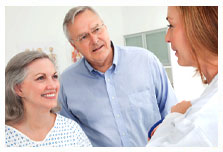|
I want to learn more about Stroke risk reduction I have atrial fibrillation (AFib) and want to learn more about stroke risk reduction I have high blood pressure and want to learn more about stroke risk reduction I have high cholesterol and want to learn more about stroke risk reduction I have diabetes and want to learn more about stroke risk reduction I have had a stroke or TIA ("mini-stroke") and want to reduce the risk of another stroke 
Talking to your doctorWorking with your doctor is an important part of managing your risk of stroke. Be prepared and learn how to talk to your doctor. How likely am I to have a stroke?After a stroke, you have a 1 in 5 chance of another stroke in the next 2 years.After a TIA, you have a 1 in 8 chance of a stroke in the next 3 months. These are general numbers, and your exact risk of stroke depends on your overall health, including your other stroke risk factors: Stroke risk factors you can't controlIf you have had a stroke, you're already at risk of having another stroke. But your risk may be even higher if you have other risk factors that can't be controlled:
If you have some of these risk factors, don't be discouraged! Now that you know you are at a higher risk, focus on reducing your risk by managing risk factors you can control. Talk to your doctor to find out about your stroke risk and what you can do to reduce it. Stroke risk factors you can controlThere are many stroke risk factors that you can change or control: Lifestyle factors:
Making a few simple lifestyle changes can help you reduce your stroke risk. Medical conditions:
Getting these medical conditions under control can go a long way toward reducing the risk of a stroke. Some people may have other risk factors for stroke. Talk to your doctor to find out if you're at risk of a stroke, and what you can do to reduce your risk. |
|
||||||||||||||||||||||||||||||||||||||||||||||||||||||||||||||||||||||||||||||||||||||||||||||||||||||||||||||||||||||||||||||||||||||||||||||||||||||||||||||||||||||||||||||||||||||||||||||||||||||||||||||||||||||||||||||||||||||||||||||||||||||||||||||||||||||||||||||||||||||||||||||||||||||||||||||||||||||||||||||||||||||||||||||||||||||||||||||||||||||||||||||||||||||||||||||||||||||||||||||||||||||||||||||||||||||||||||||||||||||||||||||||||||||||||||||||||||||||||||||||||||||||||||||||||||||||||||||||||||||||||||||||||||||||||||||||||||||||||||||||||||||||||||||||||||||||||||||||||||||||||||||||||||||||||||||||||||||||||||||||||||||||||||||||||||||||||||||||||||||||||||||||||||||||||||||||||||||||||||||||||
|
Hot Topics -
Bedwetting,
Depression,
Flu (Seasonal),
Healthy Skin,
Incontinence,
Multiple Sclerosis,
Psoriasis,
Stroke Risk Reduction
|
||
| Condition and disease information is written and reviewed by the MedBroadcast Clinical Team. |
||
|
|
The contents of this site are for informational purposes only and are meant to be discussed with your physician or other qualified health care professional before being acted on. Never disregard any advice given to you by your doctor or other qualified health care professional. Always seek the advice of a physician or other licensed health care professional regarding any questions you have about your medical condition(s) and treatment(s). This site is not a substitute for medical advice. © 1996 - 2024 MediResource Inc. - MediResource reaches millions of Canadians each year. |
|





